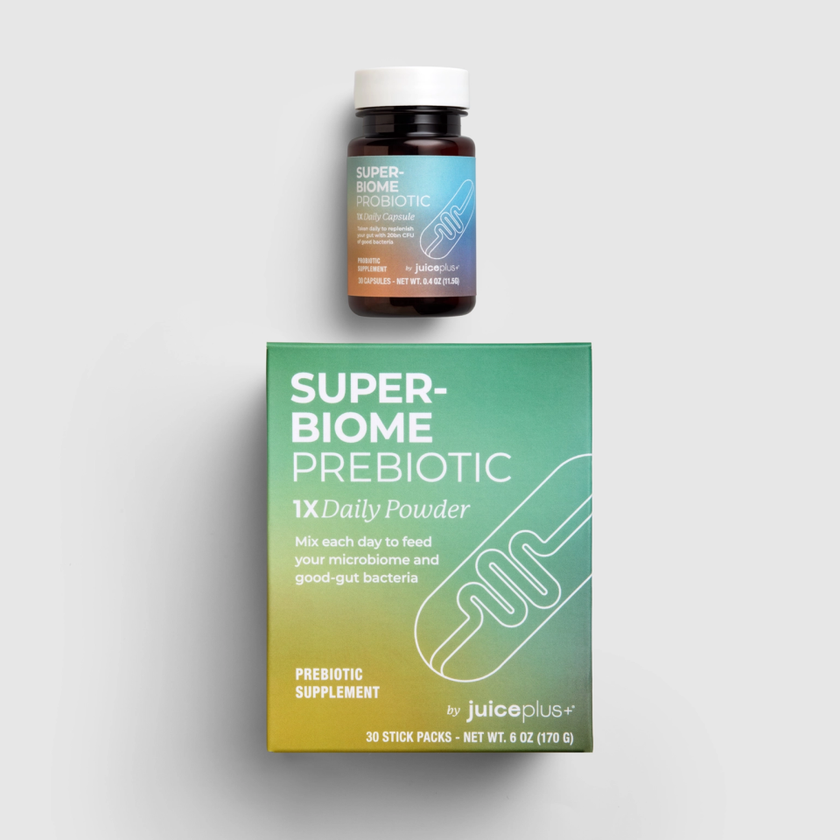Your gut does more than digest food — it plays a key role in immunity, mood, energy levels, and even skin health [1]. But to keep your gut microbiome healthy, you need to feed it the right foods.
To get you inspired, we’ve put together a complete guide to the best foods for gut health and how to make them part of your daily routine.
Why food matters for gut health
Your gut microbiome is home to trillions of bacteria — some beneficial, some harmful. The balance between the two is vital. The “good” bacteria need fuel in the form of prebiotic fibers, plant-based nutrients, and fermented foods to flourish. The better you feed them, the better they support your whole body [2][3].
1. High-fiber fruits and vegetables
Fiber is the ultimate gut-friendly nutrient. It helps keep digestion regular, supports a healthy gut lining, and feeds the good bacteria [4].
Top picks:
- Apples – contain pectin, a type of prebiotic fiber [5].
- Leafy greens – spinach, kale, Swiss chard
- Berries – blueberries, raspberries, strawberries
Tip: Aim to get a variety of colors on your plate, so you can enjoy a wide range of plant nutrients.
2. Fermented foods
Fermentation is a process that encourages the growth of probiotics — live bacteria that support your gut health [6].
Great options include:
- Yogurt with live cultures
- Kefir
- Sauerkraut
- Kimchi
- Miso
- Tempeh
These foods naturally contain beneficial bacteria that can complement your diet and improve gut diversity.
3. Legumes and beans
Chickpeas, lentils, and black beans are packed with fiber and plant-based protein. They also contain resistant starch (see above), which acts as prebiotic fuel for your microbiome [7].
4. Nuts and seeds
Looking for something quick and easy? Walnuts, almonds, chia seeds, and flaxseeds are rich in fiber, omega-3 fatty acids, and antioxidants — all beneficial for gut and heart health [8].
5. Prebiotic-rich foods
Prebiotics are non-digestible fibers that feed the good bacteria in your gut [9].
Prebiotic powerhouses include:
- Chicory root
- Jerusalem artichoke
- Garlic
- Onions
- Asparagus
- Leeks
6. Polyphenol-rich foods
Polyphenols are plant compounds with antioxidant properties that gut bacteria love [10].
You can find them in foods like:
- Green tea
- Dark chocolate (70%+ cocoa)
- Red grapes
- Olive oil
Looking for inspo? A daily gut-friendly plate could look like:
- Breakfast: Oatmeal topped with berries, flaxseeds, and a dollop of yogurt
- Lunch: Lentil salad with spinach, walnuts, and olive oil dressing
- Snack: Apple slices with almond butter
- Dinner: Quinoa with roasted asparagus, garlic, and tempeh
The role of supplements
Even with a great diet, it’s hard to get enough of the right probiotic strains and prebiotic fibers daily. That’s where a high-quality supplement can help fill the gap.
A combined probiotic + prebiotic approach, like Juice Plus+ Super-Biome, ensures you’re both adding beneficial bacteria and feeding them with the fuel they need to thrive.
Diversify and nourish
For the healthiest gut, aim for a diverse diet rich in plant foods, fermented products, and prebiotic fibers — and consider pairing it with a daily probiotic-prebiotic routine for extra support.
This professional is affiliated with Juice Plus+ and may receive commissions or other compensation from product sales made within their organization. Any reference to professional credentials is provided for identification purposes only and should not be interpreted as a health or medical endorsement of Juice Plus+ or its products by any authority or institution. The views and opinions expressed are those of the professional and do not necessarily reflect the official position of Juice Plus+. Content is for informational purposes only and is not intended to provide or replace care or advice from a healthcare professional. Results may vary. Individual experiences and outcomes can differ based on factors such as health status, diet, and lifestyle. Statements have not been evaluated by the FDA. Products are not intended to diagnose, treat, cure or prevent any disease. Always consult your healthcare provider before using any nutritional products or starting a new health program.
References
- Harvard Health Publishing. The gut-brain connection. Harvard Medical School, 2021.
- National Institutes of Health (NIH). The human microbiome: How it works and why it matters. 2020.
- Valdes AM, et al. Role of the gut microbiota in nutrition and health. BMJ. 2018;361:k2179.
- Slavin JL. Dietary fiber and body weight. Nutrition. 2005;21(3):411–418.
- Voragen AGJ, et al. Pectin, a versatile polysaccharide present in plant cell walls. Structural Chemistry. 2009.
- Marco ML, et al. Health benefits of fermented foods: microbiota and beyond. Curr Opin Biotechnol. 2017;44:94-102.
- Martínez I, et al. Gut microbiome composition is linked to whole-grain consumption. Am J Clin Nutr. 2013;98(2):439–445.
- Ros E. Health benefits of nut consumption. Nutrients. 2010;2(7):652–682.
- Gibson GR, et al. Dietary prebiotics: current status and new definition. Food Sci Technol Bull. 2010.
- Cardona F, et al. Benefits of polyphenols on gut microbiota and implications in human health. J Nutr Biochem. 2013;24(8):1415–1422.








